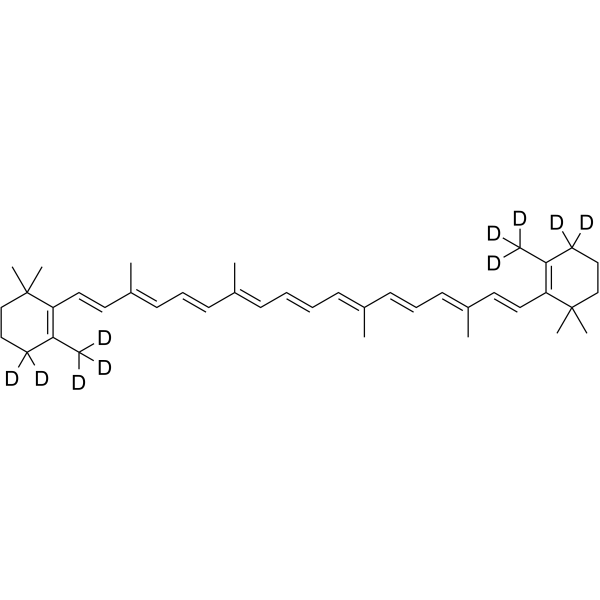β-Carotene-d10
Modify Date: 2024-01-09 20:38:44

β-Carotene-d10 structure
|
Common Name | β-Carotene-d10 | ||
|---|---|---|---|---|
| CAS Number | 1331639-85-0 | Molecular Weight | 546.93 | |
| Density | N/A | Boiling Point | N/A | |
| Molecular Formula | C40H46D10 | Melting Point | N/A | |
| MSDS | N/A | Flash Point | N/A | |
Use of β-Carotene-d10β-Carotene-d10 (Provitamin A-d1) is the deuterium labeled β-Carotene. β-Carotene (Provitamin A), a carotenoid compound, is a naturally-occurring vitamin A precursor. β-Carotene is a modulator of reactive oxygen species (ROS), with antioxidant and antiinflammatory activities. β-Carotene may serve as an antioxidant or as a prooxidant, depending on its intrinsic properties as well as on the redox potential of the biological environment in which it acts. β-Carotene induces breast cancer cells apoptosis, with anticancer activities[1][2][3][4][5]. |
| Name | β-Carotene-d10 |
|---|
| Description | β-Carotene-d10 (Provitamin A-d1) is the deuterium labeled β-Carotene. β-Carotene (Provitamin A), a carotenoid compound, is a naturally-occurring vitamin A precursor. β-Carotene is a modulator of reactive oxygen species (ROS), with antioxidant and antiinflammatory activities. β-Carotene may serve as an antioxidant or as a prooxidant, depending on its intrinsic properties as well as on the redox potential of the biological environment in which it acts. β-Carotene induces breast cancer cells apoptosis, with anticancer activities[1][2][3][4][5]. |
|---|---|
| Related Catalog | |
| In Vitro | Stable heavy isotopes of hydrogen, carbon, and other elements have been incorporated into drug molecules, largely as tracers for quantitation during the drug development process. Deuteration has gained attention because of its potential to affect the pharmacokinetic and metabolic profiles of drugs[1]. |
| References |
| Molecular Formula | C40H46D10 |
|---|---|
| Molecular Weight | 546.93 |